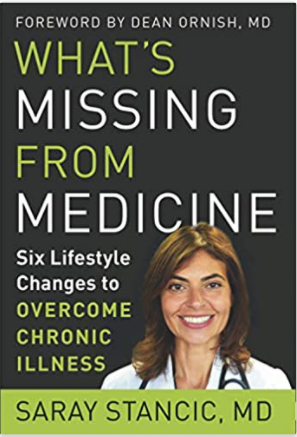Weekend Reading: What’s Missing from Medicine
Saray Stancic. What’s Missing From Medicine: Six Lifestyle Changes to Overcome Chronic Illness. Hierophant Publishing, 2021.

I don’t usually recommend books about topics other than food politics, but this one has dietary changes at its core and although I have never met the author, I greatly admire her and her work.
I first heard about Dr. Stancic, who has a practice in New Jersey, when I was invited to watch a documentary film about her, Code Blue. I was interested to see it because I was told I appeared in it, which I did for about 10 seconds. I don’t remember meeting her or filming it (I tend not to remember such things), but the film is impressive and well worth seeing.
It tells her personal story of how she was able to get control of her formerly debilitating multiple sclerosis with a plant-based diet and exercise—good advice for everyone. The film goes beyond the personal and talks about why she never understood the importance of diet: lack of nutrition education in medical schools, media confusion, inadequate government policies, and the overwhelming influence of drug, food, and beverage companies. The film moves quickly and I thought it was much better than most documentaries of this type.
What made it work for me is Stancic, who comes across as committed, but sane and likable. I would send anyone who has MS to see her in a shot. She’s my kind of doctor—one who listens to patients and works with them. The film’s message leans toward veganism, but without ideology and pushed only softly even by the strongest proponents she interviewed.
The book makes the same points. It’s great strength is that it makes lifestyle changes seem possible for anyone.
Here’s what drove her to healthier eating:
My physicians warned me that it was irresponsble to wean myself off of the ten to twelve medications I was taking daily (and that were making my life unbearable) and solely manage my MS with an “unproven lifestyle change” [i.e., diet]…I adoped a whole foods, plant-based diet becasue the overwhelming body of scientific literature pointed to those foods as the best diet for optimal health for all people. At that point, I knew I could not face a lifetime of living as I was—with a huge pillbox, cane, diapers, and the other physical and psychological burdens of MS [p. 36].
Her advice about how to eat more plant foods is sensible and easy to follow. I particularly like her lack of dogmatism. In a section on common food myths, she has two about meat:
Myth 1: We need to eat meat and dairy to be healthy. FALSE [p. 57].
Myth 2. Eating animal products of any kind is bad for your health. FALSE [p. 59]
Most of the book is about other changes that can help everyone cope with chronic disease: movement, stress management, sleep, avoiding substances, human connections. All of these messages are aimed at giving us the power to control our own health, and to make doing so seem entirely possible.
I found the book inspiring. Her wish for us:
May we eat well, relish physical and mental challenges, enjoy restorative sleep, and connect deeply with others [p. xxxiii].
This is good advice for all of us these days.

